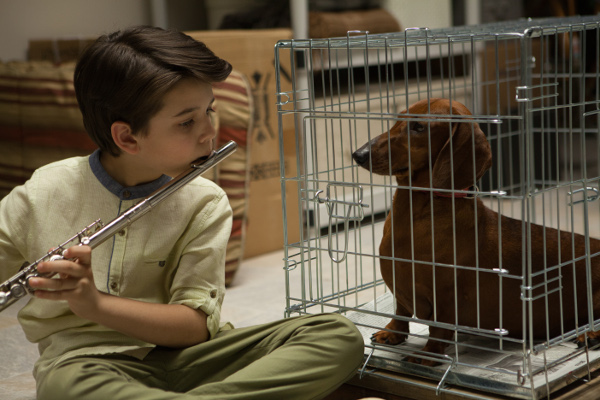
– By Cate Marquis –
WIENER-DOG is Todd Solondz’s typically dark, disturbing humor
WIENER-DOG is a four-part film that follows a little dachshund as she moves from owner to owner, from director/writer Todd Solondz. Solondz is a precise, gifted filmmaker with a taste for the distasteful and darkly humorous social commentary. For fans of the indie writer/director, this film is quintessential stuff. But a warning to the sensitive – it does not end well for the dog. That should be expected from Solondz – it rarely ends well for his human characters either.
Solondz is known for films filled with awful people, or at least people doing awful things to other people, a kind of misanthropic filmmaker whose breakout film was the 1995 “Welcome to the Dollhouse.” Solondz is a love-him-or-hate-him kind of director, meaning fans will relish this film because it is so much in his caustic, disturbing style while others will find it leaves a sour taste for the same reason.
Starting with the dog as a puppy, a sweet little female dachshund is shifted from place to place, including a little boy with the worst parents (played by Julie Delpy and Tracy Letts), a frustrated screenwriter played by Danny DeVito, and a bitter old woman played brilliantly by Ellen Burstyn. The little dog gets her best home with a kind-hearted veterinary technician played by Greta Gerwig, but nothing good lasts in Solondz’ world.
The first story begins with a little boy named Remi (Keaton Nigel Cooke), a nine-year-old cancer survivor, who gets a dachshund puppy as a pet. The boy names her Weiner-Dog but any chance of a warm-hearted boy and his dog story is short-circuited by his self-absorbed parents. The fussy parents keep the cute puppy locked in a cage in the laundry room, presumably to avoid messes in their fashionably ultra modern house – and any responsibility to train her. Remi can only play with his pet through the cage bars. A trip to the vet to get the female pup spayed leads to an appalling conversation in which Delpy gives the worst description of what will happen, followed by an even more inappropriate discussion involving doggy rape, venereal disease, and a mongrel dog named Mohammad, while the little dog recuperates alone in her cage.
When these awful parents go off to yoga, leaving the boy home alone, Remi takes the opportunity to let Weiner-Dog out of her cage to play. The boy and the dog have a great time making a mess of the house, which is capped off when the dog eats a granola bar and gets diarrhea. This gives Solondz a chance for a long, lingering tracking shot tracing the trail of poo, in an orgy of excrement, as Debussy’s “Clair de Lune” plays. The scene seems to run forever, until the parents pack the dog off to the vet to be euthanized.
Are you charmed? Unlikely – yet this bitingly dark social commentary and scatological humor is what people love (or hate) about this director. The little dog is not euthanized after all, but is smuggled out by a kindly veterinary assistant named Dawn Wiener (Greta Gerwig), the character from “Welcome to the Dollhouse” now grown-up. The little dog and her new owner go on a strange road trip, prompted after Dawn runs into someone she knew from high school at a convenience store, and ending with a married couple who seem to have Down’s Syndrome. This odd segment is the dog’s happiest experience in the film, and the story is even strangely touching.
This interlude ends with an “intermission,” a hilarious sequence where Solondz both mocks pretentious film-making and simply interjects a little fun. As the dachshund trots across an ever-shifting series of CGI landscapes, a cowboy singer warbles a Western movie ode to the dog.
This bit of comic relief is followed by the film’s most satiric sequence. The dachshund is now owned by Mr. Schmerz (Danny DeVito), a professor at a New York film school, who is living on the fumes of his one Hollywood hit, a comedy made decades earlier. The sequence allows Solondz to poke fun at wanna-be filmmakers, film schools, one-hit wonders, and “secret formulas” for script writing. There is a particularly hilarious bit where an applicant to the film school repeatedly asserts he loves all films yet cannot name a single one. Schmerz barely pays attention to his students anyway, instead obsessively trying to reach his elusive agent about the script he sent him months earlier. The sequence ends is meltdown of anguish and humiliation.
In the last segment, the little dog now belongs to a bitter old woman, played by Ellen Burstyn, who is visited by her long-absent granddaughter. Burstyn is outstanding in this part, bringing out nuances of regret and sadness, and it is the most moving of the segments. A scene as the segment winds down allows Solondz to end his film on a sour and darkly disturbing note.
If you are a fan of Solondz’s films, this one is quintessentially his style. But if you do not care for his misanthropic view, or if you are soft-hearted about dogs, you might want to give a pass to this intermittently darkly comic but disturbing film.
© Cate Marquis